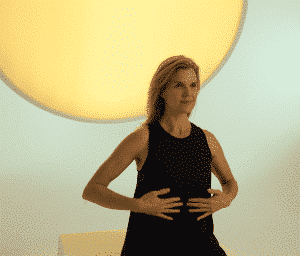
Getting to know Jesus is a pursuit that consumes our whole being. Therefore, we've been considering what it means to connect with God entirely; incorporating our minds, souls and bodies through mindful movement into our devotional and worship practises. Our Glorify Body Serieshas been designed to reveal how our physiology can help us to develop intimacy with God. It explores how mindful movement, breathing exercises and stretch routines can be tools to help us glorify God with our lives and bodies. This post links in with that same theme. We are not here just to give 'some' of our being to God. We want to know what it means to give our whole lives in surrender to Him. That includes understanding and honouring our bodies in the way that they were designed to be used.

If we were to head into the streets (or maybe a church) and ask “how can people connect with God?”, we would likely get many similar responses: pray; read the Bible; go to Church; spend time in silence; watch a sunset. Such responses are beautiful and legitimate. There’s no doubt that all of them are effective and fruitful ways of deepening your relationship with Jesus. However, have you ever considered that there may be other ways to facilitate intimacy with God that you might not have thought of? Today, we will explore three unconventional, more physiological, ways of connecting with God. Hopefully, they will inspire you to reflect on your own spiritual practises and maybe even try something new, because variety keeps a relationship interesting, right?

Our relationship with God can be more holistic than we realise. It can exist outside a Sunday service or a quiet time in the morning. In fact, our journey with Jesus can permeate every part of our existence, if we will let it. In order to experience God differently, we need to do something different. As the modern proverb goes, “life begins at the end of your comfort zone”. Perhaps that is true of your spiritual life, too. This is why we are focussing on physiological methods of building intimacy with God. They are slightly less common but they might just work. We are such intricately created physical beings: 30-trillion or so cells in each of our bodies; a DNA code so unique to you and carefully copied into each cell that it would be the equivalent of copying a book 40,000 times and only making one spelling mistake. When you think about it, it just makes sense that our bodies, these God-created masterpieces, can play a valuable part in our relationship with Him through mindful movement. Our faith isn't just 'mind games'... Consequently, why not give one of these three unconventional spiritual methods a try today?

"Blessed is the one...whose delight is in the law of the Lord, and who meditates on His law day and night." Psalm 1:1-2 Our modern environments are stuffed full of constant, overwhelming, stimuli. We are saturated daily with content and information. Deep scriptural meditation is one way we can help our bodies cope with the stresses of life while simultaneously enhancing our spiritual lives. The theologian J.I. Packer writes this: "Meditation is the activity of calling to mind, and thinking over, and dwelling on, and applying to oneself, the various things that one knows about the works and ways and purposes and promises of God… It is an activity of holy thought, consciously performed in the presence of God, under the eye of God, by the help of God, as a means of communion with God." Meditation is relational, creating a focal point to help us be present with God and to reflect upon Him. It is also positional, forcing us to find practical space within the chaos of our fast-paced lives and reminding us to slow down. Consequently, meditation is very much a physiological experience as well as a psychological and spiritual one: it involves our minds, bodies and spirits. Despite its benefits, however, many Christians are still wary of meditation. Here at Glorify, we have written a couple of blog posts that reflect on the value of scriptural meditation and midful movement. Rather than covering the same ground, why not bookmark the links below and read them later if you are interested. 9 Simple Steps to Help You Meditate on the Word of GodMindfulness and Meditation for Sleep, a Guide for Christians

"For those who are led by the Spirit [breath] of God are the children of God." Romans 8:14 It does not take a biology genius to tell you that breathing is important to our human experience. Have you ever considered, though, how intentional breath exercises could help you in your relationship with God? Breath exercises are simply exercises intended to promote effective and healthy breathing and breath control. They have been scientifically proven as something that we can all do to change our physiology quickly. Through developing healthy rhythms of breathing, we can effectively position ourselves to find peaceful and fruitful time with Jesus. When we are stressed, our breathing quickens and becomes more shallow. Breath-work helps to calm us and relieve anxiety by returning us to a state of relaxation and peace. As a result, it’s immensely powerful.
Beyond the science, though, there’s a deeper and more primary meaning to the physiology of our breathing. Our breathing is a constant and daily reminder of the presence of the life-giving God in our lives. Consequently, it has the power to connect us, in every moment, to our Heavenly Father. If we can mentally associate the physiology of our breathing to the spirituality of our breath-giving God, we can learn to harness our simple inhales and exhales to couple us to God’s presence. This can work wherever we are and whatever we are going through. The imagery of breathin is some of the most powerful in all of scripture. In Genesis, God breathes into the nostrils of the human. It is that first breath that gave humanity life and it has been doing so ever since. The Hebrew word ruach in the Old Testament and the Greek word pneuma in the New Testament, both literally translated as “breath”, are the same words used to describe God’s Holy Spirit. The authors of Scripture are making an explicit point: God’s Spirit is equated with His breath. He quite literally breathes life, both physical and spiritual, into us. This is beautifully illustrative. You have been breathing every day of your life and that very breath is symbolic of God’s spirit with you. Consequently, it is no wonder that intentionally working with our breath can have more than just physical results. There is a deep spiritual link between our breath, mindful movement and God’s life within us. Breath-work helps us to intentionally remember God’s presence in our lives and engage with it. It’s a physical tool that can have spiritual impact. As a result, be encouraged today to give breath exercises a go.

"Therefore, I urge you, brothers and sisters, in view of God’s mercy, to offer your bodies as a living sacrifice, holy and pleasing to God—this is your true and proper worship." Romans 12:1 Physical movement is something we all naturally incorporate into our spirituality, even if subconsciously. Despite any preconceptions you might have, using your body to connect with God doesn’t have to be something weird or mystical. Perhaps you pace around when you pray. Maybe you sway or dance to worship music. Perhaps you bow your head in reverence or reach out your hands like a child reaching out to their parents when you need help. It’s as if we all intuitively know that mindful movement can help us to interact with our heavenly king. Think about it this way: we are used to communicating with our bodies when we relate to other humans (we call it 'body language'). Why wouldn’t we do the same in our relationship with Jesus?
We have been created in a way that physical movement facilitates our spiritual connection with God. Understanding this and exploring it a little more may just open a door for you to experience God more radically and deeply than you have experienced Him before. Of the seven major words used in the Hebrew scriptures to describe worshipping and praising God, all of them incorporate a movement dimension. The word Yadah, for example, means 'to praise with thankfulness and outstretched arms'(2 Chron. 20:21). Towdah means 'to raise hands in adoration and thankfulness for things not yet received' (Psalm 50:14). Barak means 'to kneel down to bless God as an act of adoration'(Psalm 95:6). Hopefully you are starting to get the picture. Mindful movement with our bodies can deepen our level of engagement and intimacy with Jesus. Through practises such as stretch routines hereor tapping sequences here we can learn to still our bodies, control our emotions and regulate our stress-levels to the extent that the quiet voice of God is more audible than ever in our lives. As we explore the power of mindful movement, we have a tantalising opportunity to go deeper in our relationship with God than we ever thought possible. Caring for our bodies and intentionally using them to the glory of God is a powerful antidote to the stresses of modern culture. This is what the Glorify Body Series is all about. Join us as we learn mindful movement together and harness it towards knowing God more.
Download Glorify Today